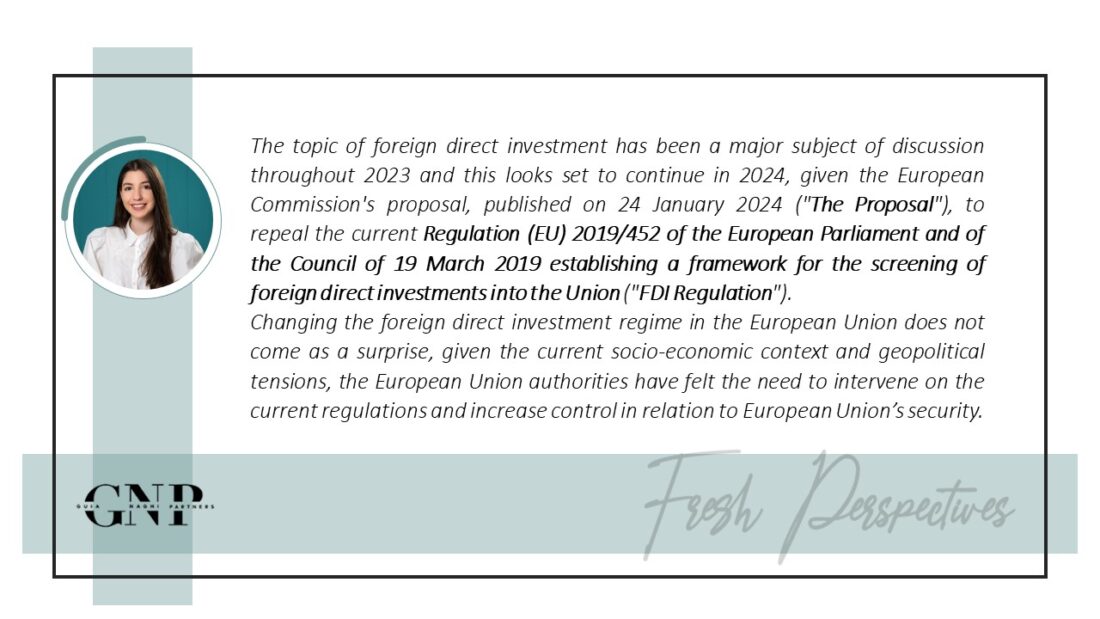Andreea Ivăniș – Upcoming revision of the FDI Regulation
The FDI Regulation’s shortcomings
In order to keep away from interfering in the national security policy of Member States, the FDI Regulation has left a large degree of freedom to Member States to design their own foreign investment screening mechanisms. The provisions contained in the FDI Regulation were more of a recommendation for Member States, without imposing concrete obligations in terms of screening sectors, notification thresholds or the procedure Member States must follow when screening foreign direct investment.
Given this wide margin for regulation by Member States, not only have they implemented the recommendations contained in the FDI Regulation differently, but some Member States have even failed to implement a national mechanism for this purpose at all.
All these regulatory divergences were seen as having a negative effect on the internal market, leading to a lack of predictability for potential investors, and thus the need for intervention by European authorities increased.
Indirect foreign investments – a potential loophole in the FDI Regulation?
The FDI Regulation does not apply to indirect foreign investment, as confirmed by the Court of Justice of the European Union in the Xella case[1]. According to this decision:
- The FDI Regulation does not apply to acquisitions by EU-based buyers regardless of whether they are ultimately controlled by non-EU shareholders;
- The notion of foreign direct investment includes only investments in the Union operated by undertakings incorporated or organised under the laws of a third country;
- The FDI Regulation is only applicable to EU-based companies if these companies do not carry out a real economic activity, but only serve as a legal vehicle for making the investment (shell/letterbox company).
The Proposal addresses this issue and extends the scope of the FDI Regulation, but this matter will be detailed more below.
What are the main changes introduced by the Proposal?
One of the aims of the Proposal was to harmonize the foreign investment regime at Member State level therefore, the revision comes with a number of obligations designed to ensure more predictability and consistency at Member State level. Some of the main changes include:
- Member States’ obligation to develop and implement national screening mechanisms
The Proposal requires Member States to implement a screening mechanism that meets the minimum requirements of the new amendments within 15 months from the entry into force of the new FDI Regulation.
For those Member States that already have such screening systems and have refined their procedures over time, these changes will not have a major impact, but will be more of a challenge for those states that are at an early stage of regulating foreign investment.
- Extending the scope to indirect and greenfield investments
Contrary to the findings in the Xella case, investments made by an EU undertaking, which is incorporated and operates in accordance with the laws of a Member State will be obliged to notify the competent authorities for the purpose of examining and approving its investment, as long as the EU-based undertaking is controlled by a non-EU shareholder.
In determining whether an EU undertaking seeking to make an investment in the territory of the European Union is subject to the screening mechanism it isrelevant to assess if the EU undertaking is controlled, directly or indirectly, by a foreign entity regardless of whether the ultimate owner is located in the Union or elsewhere.
Greenfield foreign investment occurs when the foreign investor or an EU subsidiary of the foreign investor sets up new facilities or a new company in the European Union, according to the Proposal, this type of investment will also be subject to the FDI screening mechanism.
Also, transactions with no foreign investor involvement or in which the level of involvement does not lead to the direct or indirect control of the EU entity are not covered by the Proposal.
- Minimum procedural obligations
Seeking to harmonise regulations at Member State level, the Proposal also brings a number of common procedural regulations to be implemented by Member States, among which:
- Screening mechanisms should not discriminate between different third countries or between EU Member States in which the foreign investor’s subsidiary is established;
- The screening procedure will involve two stages of analysis: (i) a preliminary examination (initial review) and (ii) an in-depth investigation (if applicable);
- Member States have the possibility to initiate ex-post control over foreign investments for atleast 15 months after the completion of a foreign investment that is not subject to authorisation;
- Member States are obliged to provide for the investors the possibility to seek judicial recourse against screening decisions etc.
- Mandatory screening
The Proposal establishes two conditions that make it compulsory for Member States to carry out an FDI analysis, namely:
- the EU target is part of or participating in one of the projects or programmes of interest to the Union set out in Annex 1 of the Proposal or
- is economically active in one of the fields listed in Annex 2 of the Proposal (e.g. energy technologies, semiconductors, AI technologies, biotechnologies).
Correlatively, the Member State operating the analysis of these sectors is also obliged to notify the European Commission and the other Member States of the respective investments under the cooperation mechanism.
- Ex-post investigations
The European Commission and the Member States have the right to launch an ‘own-initiative procedure’ if they consider that a foreign investment in another Member State, which has not been notified to the cooperation mechanism, is likely to adversely affect the security or public order. The Proposal provides for a period of at least 15 months after the investment has been completed (post-closing) within which the European Commission and the Member States can launch their own review of the investment in question.
- Multi-jurisdictional transactions
The investor who is required to notify the transaction in more than one Member State must submit those notifications on the same day to all competent authorities and Member States must align on the use of the cooperation mechanism between EU Member States and the Commission.
When will the new provisions be applicable? The Proposal will be subject to the ordinary legislative procedure, which includes one or two readings and, if necessary, a conciliation procedure and a third reading, so it is expected that it will take a couple of years before the new foreign investment rules enter into force, which may give Member States sufficient time to assess their own FDI screening mechanisms and prepare for the new regulation.
[1] C-106/22 – Xella Magyarország.





No Comments